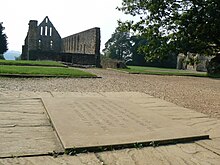Hilary of Chichester
Known for supporting his clergy and as a canon lawyer, or someone trained in ecclesiastical law, Hilary worked to have Edward the Confessor, a former English king, canonised as a saint.[9] As Dean of Christchurch, Hilary restored the organisation to its traditional round of religious ceremonies that had been abandoned by his predecessors, as well as securing grants of privileges and lands.[11] Hilary was unsuccessful as a candidate for the archbishopric of York against Henry Murdac in 1147, but Pope Eugene III chose to compensate him by appointing him to the see of Chichester.[21] The abbey had never received a papal exemption but relied instead on its royal foundation by William I of England, and its status as an eigenkirche, or proprietary church of the king.[23] The appeal backfired when Hilary obtained from both Pope Eugene III and Adrian IV orders for the abbot to obey the bishop.Both documents were admitted as genuine, and as freeing the abbey from ecclesiastical oversight, as Henry II had at his coronation confirmed all his grandfather's charters.Vincent's point is that although there was no doubt a dispute between Hilary and the abbey over a claimed exemption, as evidenced by an 1170 letter of Becket's referring to some sort of settlement between the monks and the bishop, the actual account in the Chronicle is untrustworthy.[31][32] Hilary was well known as a canon lawyer, and was often employed by the papacy as a judge-delegate, hearing cases that had been appealed to Rome, and then sent back to the country of origin for trial.[35] He acted as a legal advisor to Henry II on a number of occasions, and Hilary's clerks occasionally drew up documents for the king.[34][b] In May 1162, Hilary was part of the deputation sent to the monks of Christ Church Priory by Henry II to secure the election of Thomas Becket as the next Archbishop of Canterbury.[19] When it was suggested that a monk should hold Canterbury, as had been the custom previously, Hilary asked if the questioners thought that only one way of life was satisfactory to God.At Westminster, Henry tried to get the leading laymen and bishops to swear to uphold the old customs of England, instead of the newer canon law practices.[14] The historian David Knowles described Hilary as "an extremely quick-witted, efficient, self-confident, voluble, somewhat shallow man, fully acquainted with the new canon law but not prepared to abide by principles to the end."[43] In Hilary's favour, he was heavily involved in providing livings for the vicars who resided at the parish churches and performed the actual cure of souls, or pastoral duties, in his diocese.

Bishop of ChichesterSeffrid IJohn of GreenfordChristchurchTheobald of BecEnglandcanon lawAdrian IVJohn of SalisburyHenry of Bloisbishop of WinchesterStephen of EnglandArchbishop of YorkEugene IIIBattle AbbeyThomas BecketHenry II of EnglandArchbishop of Canterburyjudge-delegatecanon lawyerecclesiastical lawEdward the ConfessorcanonisedSalisbury Cathedralcollegiate churchsecular clergypapal chanceryRobert PullenNicholas BreakspearHenry Murdacsee of ChichesterHugh de PuisetBishop of DurhamRobert of GhentDean of YorkLord ChancellorBishop of ElyRobertBishop of BathWilliam de TurbevilleBishop of Norwichpluralitychurch councilRobert de BethuneBishop of HerefordGervase of CanterburyGilbert Foliotsee of HerefordFlandersRobert de SigelloBishop of LondonJosceline de BohonBishop of SalisburyHugh BigodFramlinghamexemptionWilliam I of EnglandeigenkircheAbbot of BattleWalter de LucyRichard de LuciChief JusticiarColchesterHenry I of Englandecclesiastical privilegescathedral chapterHenry Mayr-HartingSheriff of SussexRobert de ChesneyBishop of LincolnExchequerAlexander IIIWestminster AbbeyChrist Church Prioryquarrelclerical ordersminor onesLouis VII of FranceDavid Knowlesvicarscure of soulsStephen's reignChichester CathedralArchdeacon of LewesBarlow, FrankBartlett, Robert C.Cheney, C. R.Page, WilliamHudson, JohnKnowles, DavidMayr-Harting, HenryThe English Historical ReviewPoole, Austin LanePowell, J. EnochWarren, W. L.Williams, AnnCatholic Church titlesWilliam of YorkBishops of ChichesterWilfridEadberhtSigeferthAluberhtOswaldGislhereWihthunÆthelwulfCyneredGuthheardWighelmBeornheahWulfhunÆlfredBrihthelmEadhelmÆthelgarOrdbrihtÆlfmærÆthelric IGrimketelÆthelric IIStigandGodfreyRalph de LuffaSeffridSimon of Wells